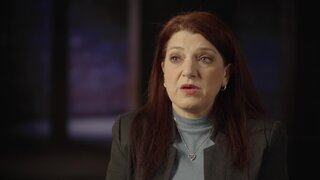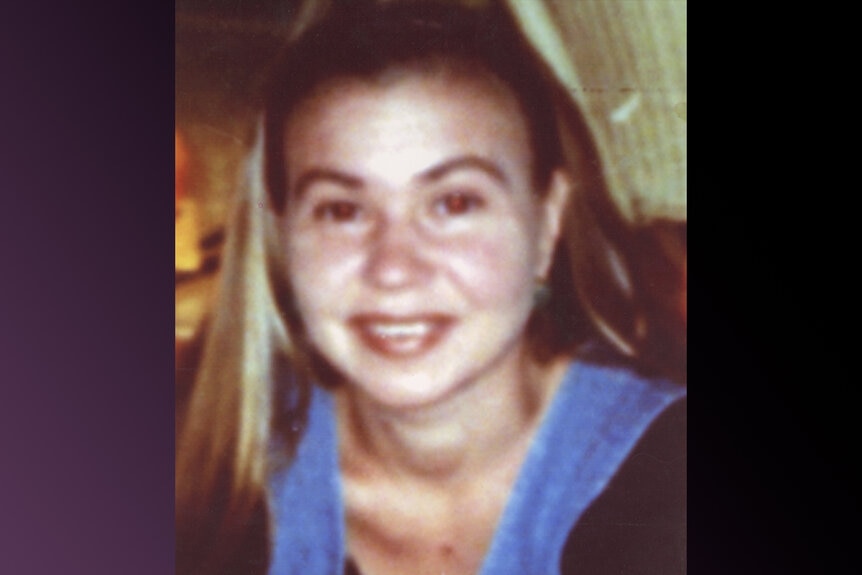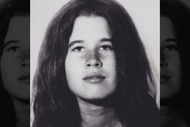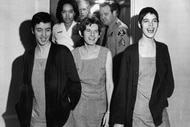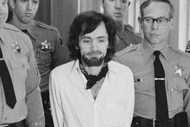Create a free profile to get unlimited access to exclusive videos, breaking news, sweepstakes, and more!
Search for Missing Translator Leads to Fraudster's Arrest: "He Threatened to Kill Me"
The 2007 disappearance of Irina Malezhik led to the arrest of Dmitriy Yakovlev, who was suspected of the 2005 murder of Viktor Alekseyev and the 2003 disappearance of Michael Klein.
The disappearance of a Ukrainian immigrant sent authorities investigating possible ties to the Russian mob, yet to learn that the answers might land at the feet of a suspected serial killer in Brooklyn.
Russian translator Irina Malezhik, 46, moved to the United States after divorcing her husband in Ukraine, citing New York City as the “center of the universe,” friend and landlord Alla Berger said in the season finale of New York Homicide, now available on Oxygen. Malezhik was successful in her professional life, translating suspected criminals’ conversations that had been intercepted by government agencies, such as the U.S. Attorney’s Office.
Malezhik lived a quiet life in the heavily Russian neighborhood of Brighton Beach, Brooklyn, where she and her close friend, Olga, regularly walked along the beach or nearby Coney Island. But in October 2007, Olga could not get ahold of her friend.
“Over the course of a week or two, she left a number of messages,” New York Post crime reporter Mitchel Maddux said.
On November 8, 2007, Olga contacted Berger, who in turn called authorities at N.Y.P.D.’s 60th Precinct to request a welfare check. They went to Malezhik’s apartment and found it void of many furnishings and possessions, though police would later say she preferred a more spartan way of life.
RELATED: Was a Woman Behind Her Husband's 2000 Disappearance Once Believed to be Russian Mob Hit?
Surveillance footage from the apartment building showed Malezhik leaving on Oct. 15, 2007, at around 1:40 p.m., briefly stopping to check her hair in the mirror.
They would be her last known movements.
The Search for Irina Malezhik
While friends and local N.Y.P.D. authorities, including Det. Wendell Stradford for Brooklyn’s Cold Case Squad, looked into Malezhik’s final movements — documented 22 days before she was reported missing — Feds with the U.S. Attorney’s Office were already conducting their own private investigation. Around the time Malezhik disappeared, she’d been translating for the Feds as part of an ongoing fraud investigation into the Russian mob.
The F.B.I. also joined the new missing persons’ case.
“Generally, what we’ve seen in organized crime cases, where there’s a retaliatory killing, it’s somebody that’s operating in that world,” said Agent Tracie Razzagone for the F.B.I.’s Organized Crimes Squad. “Nothing’s out of the realm of possibility with these cases.”
Law enforcement would follow up with multiple tips, including a jailhouse informant who sent federal agents on a “wild goose chase,” according to F.B.I. Special Agent Steven Ruscio.
“You want to try and do things as covertly as you can when you’re dealing with the mafia,” Ruscio told New York Homicide. “We spent nine months of time working around the clock… it was dead end after dead end.”
A couple is arrested in connection to Malezhik’s disappearance
After exhausting all avenues surrounding possible ties to the Russian mob, authorities looked at Irina Malezhik’s financial records. Documents showed the missing woman endorsed a check to someone named Dmitriy Yakovlev — which isn’t an all-too-uncommon name in the Russian community — and the check was deposited two days after Malezhik’s last-known movements.
Agent Razzagone also sifted through Malezhik’s credit card records, which revealed about $22,000 in retail purchases. Some of the high-priced transactions would have required Malezhik to contact financial institutions to clear the purchases, and a woman — not believed to be Malezhik — did just that.
Investigators visited several locations where the credit cards were used, soon finding video footage of a couple, later identified through Homeland Security files as married couple Dmitriy and Julia Yakovlev.
According to Det. Wendell Stradford, investigators visited the Yakovlevs’ affluent home in the gated community of Brooklyn’s Sea Gate neighborhood. There, they’d spot Mrs. Yakovlev.
“She’d be walking their little toy dog, smoking a cigarette in high-heeled shoes,” Stradford told New York Homicide. “She looked to be high-maintenance. Dmitriy just looked like a weaselly, like a rat, but he just had that look, like, ‘I’m the man.’”
On July 24, 2009, the U.S. Attorney’s Office green-lit the arrests of Julia and Dmitriy Yakovlev for federal charges of identity theft and grand larceny.
During questioning at 26 Federal Plaza in Manhattan, investigators discovered Yakovlev served two years in the Soviet military and trained as a surgeon before becoming a practicing physician in the U.S.S.R. Eventually, he relocated to America and shifted careers, focusing on real estate and flipping homes.
RELATED: Dirty Dancing Actress Shot Execution Style in 2001 Carnegie Deli Murders
The Previous Vanishing of Viktor Alekseyev
During questioning, Yakovlev admitted that he also acted as a loan shark of sorts, and when people owed him money, he often used their credit cards to recoup his monies. As was the case with Irina Malezhik, whom Yakovlev claimed took out a $20,000 loan for furniture.
Yakovlev also spilled that this was the case for a man authorities hadn’t heard of: Viktor Alekseyev.
Investigators spoke with Yakovlev’s known acquaintances, with one Sea Gate neighbor claiming that around the time of Malezhik’s disappearance, Yakovlev had his basement floor ripped from the home.
“We thought maybe he buried Irina’s body under the basement floor,” Agent Ruscio told New York Homicide. “That gave us probable cause to get a search warrant.”
Investigators searched the Yakovlev home in August 2009, but there was no sign of Malezhik’s remains. However, in an adjacent boiler room, they found a suspicious bunch of photos showing an unknown couple engaged in sexual activity, a set of keys, and a pair of thong underwear that seemed to have been hidden.
Meanwhile, authorities went to visit Viktor Alekseyev in a nearby Sea Gate, Brooklyn, home, finding a tenant who said Alekseyev had been dead for some time.
“That really made the hair on the back of our neck stand up,” said Agent Razzagone.
Agent Ruscio said the tenant grew agitated before telling Feds that Alekseyev, a Russian jewelry dealer, had been murdered.

“The guy, you’re digging in his basement, murdered him,” Ruscio told New York Homicide. “I was taken aback.”
On December 19, 2005 — two years before Irina Malezhik’s disappearance — Dmitriy Yakovlev went to Alekeyev’s home to help him move a safe before taking Alekseyev to the airport to catch a flight to Russia. However, Alekseyev’s ex-girlfriend was scheduled to drive Alekseyev herself, but he was already gone by the time she arrived.
Alekseyev never boarded any outgoing flight.
On January 8, 2006 — about 21 months before Malezhik’s disappearance — a local patrol officer found garbage bags filled with severed human remains in South Mountain Reservation, New Jersey, about 40 miles northeast of Brooklyn. It was also where Dmitriy Yakovlev once lived.
Essex County prosecutors confirmed the human remains belonged to Alekseyev.
“She [the medical examiner] explained to us that the bone wasn’t sawed,” said Det. Stradford. “He cut through the soft tissue around the knees, around the wrists, the hips; he was dismembered by someone who was in the medical profession.”
For agents, it matched Yakovlev for his surgical expertise.
Federal agents identified Alekseyev and his ex as the ones in the photos found in Yakovlev’s basement, which were previously locked in the victim’s safe, according to Alekseyev’s ex. Near Alekseyev’s body, detectives also discovered VHS tapes containing soap operas that Alekseyev and Yakovlev would watch together and a Dracula mask believed to be owned by Yakovlev.
Additional murders stack up against Dmitriy Yakovlev
Feds continued to investigate Yakovlev, who was now the prime suspect for the December 2005 murder of Viktor Alekseyev and the October 2007 disappearance of Irina Malezhik. Locals also alerted investigators to the earlier disappearance of an elderly man, Michael Klein.
Klein, a former mechanic who’d also make money by flipping houses, had just sold his Brooklyn home with plans to move to the Long Island town of Mastic, New York — about 60 miles east of Brooklyn. Klein was last seen on Nov. 6, 2003 — two years before Alekseyev’s murder and four years before Malezhik’s disappearance — just after closing on his home and collecting nearly $350,000.
At the time, police assumed he took the money and left of his own volition, despite Klein’s common-law wife filing a missing persons’ report.
In August 2009, agents investigating Alekseyev’s murder and Malezhik’s disappearance visited Klein’s partner’s Mastic home.
RELATED: How NYC Man’s 1990 Murder Became State’s First Anti-Gay Hate Crime Conviction
“Eventually, she told us, after she went to the police, Dmitriy Yakovlev went all the way out to Mastic, banged on her door, and she told us, ‘He threatened to kill me if I didn’t keep my mouth shut,’” said Stradford. “She lived as a recluse from that point on.”
Eventually, the keys found hidden in Yakovlev’s Sea Gate basement were determined to belong to Michael Klein. In November 2009, after investigators traveled to Kyiv, Ukraine, to collect a D.N.A. sample from Malezhik’s sister, the underwear stashed away in the basement was a match to Malezhik.
“He kept Michael Klein’s keys, a stack of photographs that belonged to Viktor Alekseyev, and he kept the underwear of Irina Malezhik,” Agent Ruscio told New York Homicide, adding Yakovlev kept the items as “trophies.”
Neither the bodies of Michael Klein nor Irina Malezhik have ever been found.
Yakovlev Convicted of Fraud
Despite the evidence against Yakovlev, federal prosecutors couldn’t charge Yakovlev with any of the three murders.
“Who knows if there are other victims out there,” Agent Razzagone told New York Homicide.
Ultimately, Dmitriy and Julia Yakovlev were charged with identity theft related to all three victims, with Dmitriy getting an enhancement for committing the crimes during an act of violence.
On February 7, 2011, Julia took a plea deal and agreed to testify against her husband in exchange for a sentence of 36 months in a federal prison.
Dmitriy Yakovlev took his case to trial, and on March 3, 2011, he was found guilty as charged, receiving a 30-year sentence. He died of throat cancer while serving out his sentence.
Julia Yakovlev has since been released.
“God works in miraculous ways,” Malezhik’s friend, Alla Berger, said. “She’s vindicated… I have a closure inside me.”
Catch up on past episodes of New York Homicide on Oxygen.



